Claude Forthomme's Blog, page 47
April 18, 2013
How to Craft a Bestseller: David Farland's Not So Secret Recipe
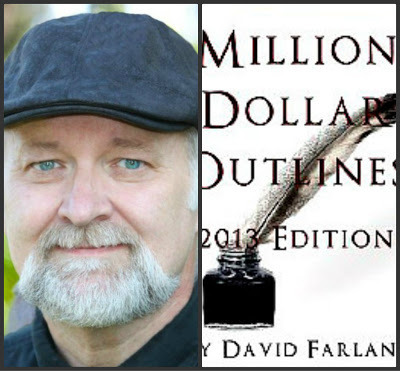
Following on last week's call to help author David Farland's son in coma (see here) through a Book Bomb event - and my post was one among several, see below - I bought his recently published 'bible' for authors, Million Dollar Outlines . This too I must have done along with thousands of other fans because his book hit #1 in paid Kindle Store for publishing guides and editing. And you know what title is #2 in that list? His other book Drawing on the Power of Resonance in Writing , focused on teaching writers how to pull on a reader's heart strings.
Amazing, isn't it? David Farland is suddenly catapulted as the leading guru for writers! Hopefully the purchase of his books, either this one or the thriller Nightingale (also doing well, standing at #41 for paranormal fantasy), have helped ensure for his son the best possible medical care.
Now that I've just finished reading Million Dollar Outlines, I'd like to share with you my enthusiasm for this book. If you're out to write a best seller, that is definitely the way to go. But David Farland warns you at the outset: if you are what he calls a "discovery writer", then this book is not for you.
Yes, there are basically two kinds of writers: those who write following an outline and those who don't, preferring to follow their creative instinct, or as Farland puts it, who "like to begin a story without really knowing where it will end. Stephen King is an excellent example of a discovery writer." I must hasten to add that I am a discovery writer too. I love to let myself be carried by my own story. If I enjoy my current work, 2213: Forever Young , it's precisely because it is a serial novel. This is a form particularly congenial to discovery writers: while I know what happens in Part Two that I am currently writing (to be published in May), I still have no idea how the next parts will develop. Sure, I know where I'm headed, I want to explore what happens in future when Science will have solved what we see as problems today (in particular aging). I also know who my main characters are, and they are going to reappear from one episode to the next: a young man named Jamie and two lovely and very different girls, Alice and Lizzie, both 99 Percenters hoping to become One Percenters, and their lives will intersect many times...But the details? No, I don't know them anymore than you do: I need to keep that unknown, otherwise I'd be too bored to write it up!
So, you may well ask, why am I so enthusiastic about Farland's book if I don't write to an outline? Two reasons:
1. Coming from the world of movies - he's had experience greenlighting films, analyzing audiences reactions in order to gauge the movie's probable success - Farland has taught a number of writing courses that are pretty unique in content, being focused on the link between films and literature, and that have proved astoundingly successful: he has taught dozens of writers who have gone on to
staggering literary success, including such #1 New York Times
Bestsellers as Brandon Mull (Fablehaven), Brandon Sanderson (Wheel of
Time), James Dashner (The Maze Runner) and Stephenie Meyer (Twilight).
2. Given this, it is fairly obvious that Farland has something special to offer even to those who consider themselves discovery writers, in particular his focus on audience analysis and identification of what he calls "emotional beats", i.e. what drives the audience, what plays on certain emotions, for example, a sense of wonder in children, of romance in women. He has set up a number of broad categories of emotions: mystery, drama, romance, adventure, wonder, horror, humor and lust. It is interesting to see how these are actually broader than classic theme-related genres (romance, thrillers, science-fiction etc) and focused on something entirely different: not a theme but emotions.
Farland's reasoning is straightforward: the number of "emotional markers" hit by a story will determine the size of its potential audience. If the story hits the wrong emotions, it will drive readers (and in the case of movies, viewers) away. For example, a story meant for teenage girls should not contain drama or pornography. As Farland put it, "teenage girls don't generally look for drama; they get enough of it in their lives. Nor do they respond well to pornography."
Hollywood is big on emotinal markers but Farland - dealing as he is with writing - goes further and refines the concept, adding something to the mix: what he calls "themes", pointing out that "there are commonalities in stories that go beyond the emotional tags." He's noticed that "tales about character growth tend to be more satisfying than those that are not...Similarly, many readers respond well to novels about friendship - gaining and keeping friends." He reports that "as a man I've noticed that tales about 'making it rich' are attractive to me. Interestingly, before I got married I was far more interested in romance - how to find and wed the right girl. Now my fantasies tend to revolve around, 'How am I going to support my family - not just for the rest of my life, but even after I die?'" He goes on to admonish us: "So look at the bestselling novels of all time. How many of them deal with themes appropriate to their audience?"
Before you give him a resounding yes - and I certainly do because that is the key to producing great literature - please stop and give a thought to that sentence that broke my heart, when he tells us his "fantasies" revolve around how to support his family. Indeed, this is heartbreaking in the light of what has happened to his son as a result of his inability to obtain adequate health insurance - a problem that appears widespread in America: see Tobias Buckel's article below that highlights how through no fault of his own, Farland could not get medical coverage.
To conclude: although I'm not personally able to produce a "million dollar outline" as Farland recommends - going up to 80-100 pages of details to cover character and plot aspects - I have no doubts that this is an excellent and proven way to obtain investment and set up winning franchises for TV, Hollywood or video games. Personally, I will stick to my old-fashioned "discovery" method of writing, but there's no doubt that Farland has hit on a key element of success: the emotional leverage that comes from knowing what your audience wants.
So if you want to write a bestseller, make sure you know your audience and hit as many emotional markers as you can. All of which has very little to do with the classic genre classification in use in the publishing industry. Incidentally, that is precisely why, once I had written A Hook in the Sky, I proceeded to look for my audience, analyzed what I saw (also using my training as an economist) and found it among the baby boomer generation. That's what Boomer Lit is all about: I didn't invent it, it was there, waiting to be discovered. Mind you, boomers are only my primary audience but there is a secondary one as well: anyone who has a boomer in his or her life would be well advised to read my book to learn more about what makes boomers tick!
Surprised? You shouldn't be, Young Adult Lit is also read by many who are mature adults: because of the emotional content, a book can be read by many more people than those that are the primary target, a prime example of this is the success of Harry Potter with older readers...
Interestingly, Farland does not go into considerations of primary vs.
secondary audiences but I'm sure that in a future revised version of his
excellent book, he will do so.
Boomer Lit titles by Claude Nougat:
Related articles
 Help author David Farland and his son Ben
Help author David Farland and his son Ben A Great Book and an Even Better Cause
A Great Book and an Even Better Cause Help A Friend of the OSR
Help A Friend of the OSR Help author David Farland and his son Ben
Help author David Farland and his son Ben Help author David Farland and his son Ben
Help author David Farland and his son Ben Help Someone in Need: A Book Bomb for Ben
Help Someone in Need: A Book Bomb for Ben Helping Ben Wolverton
Helping Ben Wolverton Help Someone in Need: A Book Bomb for Ben Wolverton
Help Someone in Need: A Book Bomb for Ben Wolverton David Farland's lack of insurance due to refusal of insurers to let him sign up for a plan
David Farland's lack of insurance due to refusal of insurers to let him sign up for a plan








Published on April 18, 2013 01:46
April 14, 2013
Our Daily Burnt Bread: The Cahuzac Scandal, Bank Secrecy and Tax Evasion

This month was marked by a series of events hitting major tax havens: the Cyprus crisis that dismantled its banking (recycling) system, the report of the Washington-based International Consortium of Investigative Journalists that released data on thousand of offshore bank accounts and shell companies and most recently, Luxemburg, the last major stronghold of bank secrecy in the Euro zone, knuckling under pressure and agreeing to drop its privacy protection rules and reveal its foreign client lists.
It was hoped Austria would follow but so far it has resisted, with its Finance Minister Maria Fekter pointing to the UK as the European Union's biggest culprit, with, as she put it, "many money laundering centers and tax havens in its immediate legal remit", including the Channel Islands, Gibraltar, the Cayman Islands and the British Virgin Islands. Before dealing with Austria, Ms. Fekter seems to feel that the European Union should first treat Britain the way it treated Cyprus before granting it a €10 billion bailout.
Tax evasion costs Europe about € 1 trillion ($1.3 trillion) a year according to the European tax commissioner. That figure did not faze Ms. Fekter one bit. As far as she's concerned, Austria is sticking to bank secrecy, full stop.
Yet that figure is one thousand times the amount Cyprus is getting to be bailed out and about one hundred times what Greece is getting. If one could do away with tax evasion, it would seem all our problems would be (pretty much) solved. Herman Van Rompuy, the President of the European Council, wants to make one more push next month at a summit meeting of the Union's 27 leaders, calling on them to discuss the issue.
France would be most likely to agree. In case you missed it, this is one of the juiciest political scandals in years. The Socialist government's budget minister, Jérome Cahuzac, the man who was supposed to fight tax evasion, was caught red-handed with money secreted in Switzerland and Singapore - not just €600,000 as he had first claimed, but as he finally confessed last week, some €15 million, the result no doubt of getting paid cash for his medical services. It seems that before he entered political life, he was a former cardiologist-turned-plastic surgeon who specialized in hair transplants, clearly a juicy business or perhaps French males are particularly addicted to their thick manes and distraught to see them thin out...
What got everyone in France really angry was Cahuzac's repeated denials over a period of four months as accusations swirled around. This made of him a confirmed serial lier as he swore his innocence in Parliament, lied to Finance Minister Pierre Moscovici and President François Hollande. As a result, both Moscovici and Hollande have seen their image plummet, and Hollande worse of all: he now has the lowest popularity rating of any French President. L'Express has called him "Monsieur Faible", the weak man. Here's the video explaining why:
Strong words! Twitter got unleashed, the French media was universally relentless in condemning him: Cahuzac's resignation three weeks ago hardly placated the critics...
Perhaps that is what is most remarkable about this story: how long it has occupied the French headlines. With a final amusing twist I just learned yesterday watching France 24 which is often full of fun tidbits...if you click that link, you're in for a surprise of a different kind, but to stay on the subject here: according to the magazine Jeune Afrique Cahuzac has broad support from African politicians who cannot understand what the French are so upset about. Good Heavens, when you reach power, the first thing you do is open a secret account in Switzerland and start moving your funds over there, right? Your predecessor did that, your successor will too, any fool knows that!
Awe, shucks! How long will it take to clean up African politics?
Latest book published by Claude Nougat on Amazon:
Related articles
 EU losing 1 trillion euros a year to tax dodging(worldbulletin.net)
EU losing 1 trillion euros a year to tax dodging(worldbulletin.net) Hollande pledges to 'eradicate' tax havens(aljazeera.com)
Hollande pledges to 'eradicate' tax havens(aljazeera.com)(uk.reuters.com)
 France's former budget minister admits lying about secret offshore account(guardian.co.uk)
France's former budget minister admits lying about secret offshore account(guardian.co.uk)(cnsnews.com)









Published on April 14, 2013 23:19
April 12, 2013
Friday Boomer Lit: Can Science Fiction Be a Sub-genre of Boomer Lit?
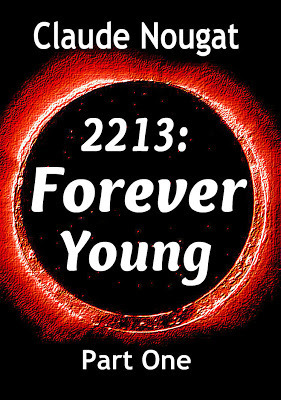
Last week I asked our Boomer Lit Goodreads Group: can science fiction, a fantasy genre normally set in the future, be considered a sub-genre of Boomer Lit? That started an interesting discussion.
I maintained it could, someone else called David disagreed. I argued that not all of Science Fiction falls under Boomer Lit, to maintain that would be silly. But certainly some of it, the kind of Science Fiction stories that place aging and death front and center just as Boomer Lit does. Books that ask how our society will handle aging and death in future.
As anyone who read our Friday Boomer Lit Blog Hop last week knows, I've just published a new book, a serial novel à la WOOL (the famous Sci-Fi best-seller that is seen by many as a successor to 50 Shades of Grey). Called 2213: Forever Young, it is set in a time when scientific advances have solved the problem of aging. In Part One, I WILL NOT LEAVE YOU BEHIND, beautiful Emma who's 122 years old learns her time is up. She's going to die within the next 10 hours...but she's in love with a handsome 99Percenter, a Swiss ski instructor who doesn't know how old she is. They are madly in love, but now what will she do?
Curious? You can get the book here, it's currently available at the promotional price of 99 cents (hurry, won't last long!) and I shall shortly give you a further snippet, as required by the rules of our blog hop. For more snippets of great Boomer Lit reads, go to http://boomerlitfriday.blogspot.it
Before you go there, let me tell you what a fellow Group member called David said, he strongly disagreed with me and I think our exchange illuminates the definition and confines of Boomer Lit:
Claude: Can we seriously consider Boomer Lit a book where NONE of the protagonists are boomers? I think we can. Boomer Lit is a frame of mind that's why I went ahead and classified 2213:Forever Young as "Boomer Lit Science Fiction"
David: With all due respect, being a Baby Boomer is not a frame of mind. It defines a specific period of time in our history. It is my opinion that Boomer Lit needs to have at the stories core, a protagonist, antagonist or group of people that meets the definition of being a Baby Boomer. I may be in the minority but Boomer Lit is written by boomers and so, the authors experiences find their way into the stories. It is something the boomers and often their children, can relate to.
Claude: Ah, you're for a strict definition of Boomer Lit! Good, here we have disagreement, I love that! My argument is that if science fiction deals with issues of immediate, profound interest to boomers,like in the case of 2213:Forever Young that deals with aging and death, then it is boomer lit...even if it is also Science Fiction. The whole story takes place 200 years from now, but the issues are Boomer Lit issues!
David: Could you then apply that definition to King Lear. It deals with aging and death...and madness. lol. My point is that just because a book deals with issues of interest to Baby Boomers that in itself, in my opinion of course, does not meet the standard of being Boomer Lit.
I thought his comments were extremely interesting, here we found ourselves standing at the very confines of Boomer Lit. Can ANY piece of Science Fiction be considered Boomer Lit? I maintain that if the central issues of that said piece are those of Boomer Lit, then it is Boomer Lit. King Lear, in my view, is simply Boomer Lit ante litteram. There is such a thing or you wouldn't have a Latin sentence for it!
It just so happens that with a whole society aging suddenly - and it is inevitably sudden, after all it's a wave: baby boomers were a "bulge" of births in the otherwise smooth demographic trends - then something happens. There are tears in the cultural fabric that is suddenly overstretched. There is a sudden, renewed, intense interest in matters that King Lear deals with: aging, death and madness. Yes, madness too - senile dementia, Alzheimer's to use today's medical terms.
After all, baby boomers represent about 28% of the total American population, a huge proportion and they control 75% of American wealth. This is a big market and one that reads and as they retire (at the rate of 10,000/day) they have increasingly time on their hands to read...Why would they not be interested in the fate of modern King Lears or of future ones?
And now, for another quick snippet from 2213: Forever Young:
Staring at my face, familiar and unchanged for a hundred years, I suppose I should have felt grateful there was not the slightest sign of damage from aging. Yet for the first time I regretted it. If only I had had some kind of warning. Time to prepare for Death like my mother had. But no, I had lived my life fully to the very last day, as if it would go on forever.
How could I’ve ever believed it wouldn’t stop? Looking young and feeling young had made me forget that we are all mortals.
And my love for him? What would happen now?
Let me know what you think. Can this book be considered Boomer Lit?
Related articles
 Boomer Lit Friday: Something New and Way Out... 2213:Forever Young!(claudenougat.blogspot.com)
Boomer Lit Friday: Something New and Way Out... 2213:Forever Young!(claudenougat.blogspot.com) Boomer Lit Featured on Major Publishing Industry Magazine(claudenougat.blogspot.com)
Boomer Lit Featured on Major Publishing Industry Magazine(claudenougat.blogspot.com) Why Boomer Lit Sells and What We Can Learn from a Boomer Best Seller(claudenougat.blogspot.com)
Why Boomer Lit Sells and What We Can Learn from a Boomer Best Seller(claudenougat.blogspot.com) My Take on Boomer Lit(joanneguidoccio.com)
My Take on Boomer Lit(joanneguidoccio.com) The Defining Science Fiction Books of the 1970s(jameswharris.wordpress.com)
The Defining Science Fiction Books of the 1970s(jameswharris.wordpress.com)








Published on April 12, 2013 06:53
April 11, 2013
Help a 16 Year Old Kid in Coma, Ben Wolverton: The Book Bomb is Today!

Help Ben, age 16, who's in coma after an accident, he's the son of New York bestselling science fiction author Dave Wolverton, a.k.a David Farland for his fantasy work. Ben needs costly medical assistance expected to rise over one million dollars - a huge sum his father cannot pay, the family has no insurance.
What happened to Ben? His tragic long-boarding accident on
Wednesday the 4th resulted in severe brain trauma, a cracked skull,
broken pelvis and tail bone, burnt knees, bruised lungs, broken ear
drums, road rash, pneumonia, throwing him into a coma.
How to help? Buy Dave Farland's books - there are two up for sale: a fantasy thriller Nightingale the
winner of the 2012 International Book Award for Best Young Adult Novel and Million Dollar Outlines, just out and already a "bible" for authors. As a bestselling author, David Farland has taught dozens of writers who have achieved amazing literary success, including #1 New York Times Bestsellers as Brandon Mull (Fablehaven), Brandon Sanderson (Wheel of Time), James Dashner (The Maze Runner) and Stephenie Meyer with Twilight.
For more information, here's an excellent article on The Examiner. Or go to the site set up for Ben, here and buy one or both books: a percentage of your purchases will go to help Ben!
You can donate money to Ben here: http://www.gofundme.com/BensRecovery
Why buy David's books today and NOW? Because it's a "Book Bomb": the point is to get a lot of people to buy a book on the same day to drive it up the books' rankings and help sales.
David Farland is keeping everyone posted on his Facebook page. Subscribe or friend him to get up-to-date information: https://www.facebook.com/david.farland1. At the moment, Ben is reported to be stable and he appears to be improving.
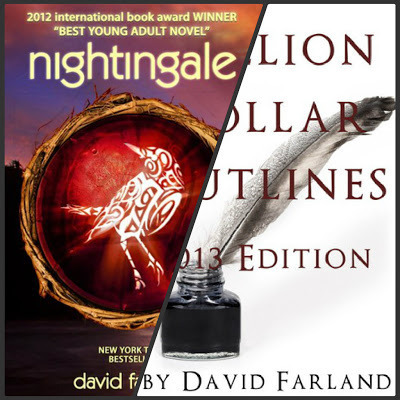
UPDATE:
1. The Book Bomb worked, thanks to everyone's contribution yesterday: Nightingale hit the top 100 in Kindle paid and Million Dollar Outlines was close behind. If you didn't buy either yesterday, you're still in time, every contribution helps!
2. from David Farland's facebook page: David made the following announcement:
We are printing a T-shirt to sell to raise
money for Ben's expenses. If you would like to sponsor you can buy a 3x5
space on the back of the T-shirt for $150. If you are interested please
call or text Tracy Thompson at (435) 632-1378. They will
be sold here on the Ben Wolverton Recovery Site, at Dixie Middle School
and High School. The artwork shown here will be on the front of the
shirt. It was done by my brother Paul Pederson
Here's the front of the T-shirt (I love it, the first 3 letters spell "BEN" - very inspirational):
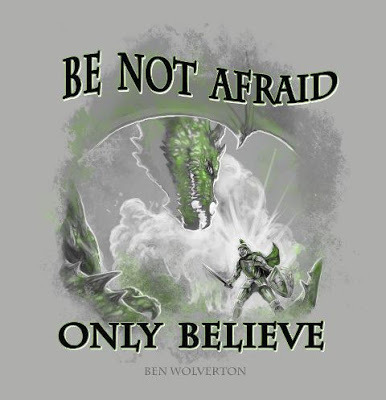









Published on April 11, 2013 01:06
April 8, 2013
Our Daily Burnt Bread: North Korea Gone Crazy, a Blessing for US-China Relations?

Of all rogue states, North Korea is the winner, with a so-called " supreme leader" who seems to have lost his head. As the world's youngest head of state, he's also the most idiotic. Kim Jong-un is an unknown quantity: he recently succeeded his father, he's believed to be in his twenties, he's married to a fashionable woman who may be a singer and has a baby daughter. But he's clearly unstable: he looks weird, pale and flabby with an old man's paunch, trying hard to look like his criminal grandfather, fat-face Kim Il-sung who invaded South Korea in 1950.
Kim Jong-un has threatened a nuclear strike against the United States, a patently absurd threat (though he could reach Guam). But an aggression against South Korea isn't. He could easily do that anytime, today, tomorrow, now that, in retaliation for the sanctions imposed on his country by the United Nations on March 9, he's renounced the 1953 armistice that ended the Korean War.
The diplomatic corps has begun to evacuate Pyongyang: when diplomats leave, it usually signals the beginning of the end. North Korean authorities have warned some embassies (Russia, Indonesia...) they cannot ensure safety of diplomats beyond April 10. Come on! What kind of country is this that flouts all international conventions?
Fat little Kim is leading his country steadily into war: he views himself as a warlord, the very image of his grandfather, probably the only way for this confused young man to express who he is.
Because he's a nobody. A void - no doubt filled by the military around him. And the military, like all military anywhere, have only one thing in mind: make war.
Plus the fact that the country is once again on the verge of economic disaster. Hunger stalks the land, medical supplies are at an all time low. The UN sanctions meant as a response to Kim's display of missiles last month only exacerbated the situation. Dictatorships famously go to war to divert attention from domestic troubles.
Not clever. The sanctions are a miscalculation and as always, they hit the innocent population the most. Creating a perfect pretext for North Korean generals to go to war.
What's next? A war with South Korea is very much in the cards. This is terrible, History repeating itself. The United States has some 135,000 troops stationed in that part of the world (28,500 in South Korea, 50,000 in Japan). Plus all the military equipment, no need to go into that and we all know it is increasing it, in preparation of a North Korean attack. What chances has North Korea got?
None, obviously. But even if it's going to be a brief incursion into South Korea, a lot of innocents will no doubt unnecessarily die.Yet the war may have an unexpected beneficial effect: an improvement in US-China relations.
China appears increasingly irritated by its small yapping neighbor and would probably be happy if it were brought to heel. This could be an opening for American diplomacy, as pointed out by the New York Times. On the other hand, China is leery of seeing the US take too big a role in the area...Much depends on how the US plays its hand: can it keep it light and quick? If not, we're going to be in deep, deep trouble, all of us.
There, I've said it. That was my Daily Burnt Bread. What's your take on the situation? Do you think it might result in better US-China relations or do you think it will worsen them?
Related articles
 N. Korea Expels All Foreigners Ahead Of Launching Missile Strike(vineoflife.net)
N. Korea Expels All Foreigners Ahead Of Launching Missile Strike(vineoflife.net) North Korea 'can't guarantee the safety of embassies'(nzherald.co.nz)
North Korea 'can't guarantee the safety of embassies'(nzherald.co.nz) North Korea crisis: How did it come to this?(newsinfo.inquirer.net)
North Korea crisis: How did it come to this?(newsinfo.inquirer.net) Crisis In North Korea Is A Farce(stirringtrouble.wordpress.com)
Crisis In North Korea Is A Farce(stirringtrouble.wordpress.com) North Korea: How worried should we be?(express.co.uk)
North Korea: How worried should we be?(express.co.uk) South Korea Says North Korea May Be Prepping for Another Nuclear Test(foxnews.com)
South Korea Says North Korea May Be Prepping for Another Nuclear Test(foxnews.com) China rebukes North Korea, says no state should sow chaos(democraticunderground.com)
China rebukes North Korea, says no state should sow chaos(democraticunderground.com) North Korea's bizarre dog attack video(stuff.co.nz)
North Korea's bizarre dog attack video(stuff.co.nz)








Published on April 08, 2013 01:59
April 3, 2013
Our Daily Burnt Bread: Mutti Merkel is Destroying Europe!

Mutti Merkel will finish the job Hitler started, you can bet on it. And to think some people claim that this is a German Chancellor with a vision of History and a commitment to Europe! Yes, a commitment to devastate Europe...
Yesterday the latest unemployment data for Europe confirmed once again how bad the situation is: never since the mid 1990s, before the Euro was created, has the number of people out of a job been so large! More than 26 million people across the 27-nation European Union. The jobless rate rose to an unprecedented 12% in the first two month of this year, of course hitting very badly Southern Europe, all the countries that are the favorite targets of Germany's austerity measures. Greece in particular: there, unemployment of the young reached an astonishing 58.4 percent in December 2012, the latest month for which data is available. And we all know that Cyprus, that has just avoided meltdown thanks to a skimpy bailout engineered by the so-called "troika", the Eurogroup, the European Central Bank and the IMF, clearly guided by Germany, is obviously next on the road of economic contraction and pain.
When will Germany ever learn that in times of recession you do.Not.Impose.Austerity.Measures?? Germany is killing off its own markets! How many people are buying BMWs or Audis in Greece or Portugal or even Italy? Sure, the US appears to be recovering and China and Japan too. Will that be enough to save Europe?
Because you can't expect any change in policy from the European ruling political class: Mutti Merkel has everyone by the throat and won't change her stance until her re-election in September, because that's what she's banking on: she is betting the German electorate will be happy to vote her back in since she's done such a good job of defending the German taxpayers against the rest of Europe.
We all know that politicians think only of saving their...seat, but this takes the cake! Mutti Merkel prefers to see Europe sink rather than entertain the simple solutions that would solve things almost instantly: like quantitative easing (the American Fed's solution) or issuing Euro-bonds that would spread the burden collectively, which would only be fair since the Euro is supposed to be a common currency.
Don't tell Mutti Merkel that she's responsible for the Euro! No, it's all the others who are, not her, not her country. Germany knows on which side its bread is buttered: it takes advantage of the Euro that keeps the prices for their exports down but will give nothing in return for this advantage! Deutschland uberall and the rest of us Europeans are left with nothing but burnt bread!
Related articles
 Reuters article: Greece may still have to quit euro - Merkel ally(forexlive.com)
Reuters article: Greece may still have to quit euro - Merkel ally(forexlive.com) Meet The Influential German Professor Who Wants To Get Rid Of The Euro In Order To Save Europe(businessinsider.com)
Meet The Influential German Professor Who Wants To Get Rid Of The Euro In Order To Save Europe(businessinsider.com) Former German chancellor Schröder defends Merkel on euro crisis(irishtimes.com)
Former German chancellor Schröder defends Merkel on euro crisis(irishtimes.com) 21st Century Germany: kinder/gentler Nazis(sgtreport.com)
21st Century Germany: kinder/gentler Nazis(sgtreport.com) The euro survives, but where are the Europeans? | Timothy Garton Ash(guardian.co.uk)
The euro survives, but where are the Europeans? | Timothy Garton Ash(guardian.co.uk)

Published on April 03, 2013 04:25
April 1, 2013
Why Amazon Bought Goodreads and What it Means for Publishing

On 28 March 2013 Amazon made an unexpected move and acquired San Francisco-based Goodreads for an undisclosed sum. Forbes says it must have been in the low 8 digits, on Twitter the figure swirling about is a modest $150 million. Clearly this is no big deal in terms of money but it shook up the world of publishing.
Twitter flew in a deafening roar of tweets. From one (@islaisreading) who exclaimed "NOOOOOOOOOOOOOOOOOOO! Amazon is buying Goodreads. What will this mean for reviews?" to others who felt quite comfortable with the idea. Literary agent Sarah Polla tweeted that "the thing is, Amazon buying Goodreads makes SO MUCH SENSE. It's dickish,
but smart. If Barnes and Noble thought of it first, we'd be congratulating them." Yes, they didn't think of it...And neither did the Big Publishers who could easily have done so, instead of wasting time on setting up their own sites like Bookish where people don't easily go, feeling this is little more than a marketing trap.
Same reaction in the blogosphere, from wringing one's hands in horror at the rise of an evil monopoly to giving enthusiastic support to Amazon. Like Scott Turow, President of the Authors Guild, who called it "a truly devastating act of vertical integration... a textbook example of how modern Internet monopolies can be built." Like author David Gaughran pooh-poohing it on his blog exclaiming: "Much of that nonsense is typical (hysterical) Amazon bashing, or reflexive defense of the status quo."And he goes on to remind everyone that there is plenty of evidence that Amazon treats its authors better than most publishers (true) and that Goodreads CEO Otis Chandler stated in a message to all Goodreads members (see his blog) that "Goodreads and the awesome team behind it are not going away" and that Amazon has pledged to support Goodreads in its "vision as an independent entity".
So is this Goodreads-Amazon deal a good or a bad thing? Does it spell a sea change, the end of Big Publishers, the rise of Amazon as the single biggest actor in the publishing industry grabbing everyone else by the throat?
The obvious first thing at stake here are the links to retailers other than Amazon. Will they remain? All indications are that they will. And that Goodreads book reviews won't be gobbled up by the Big Zon. Otis Chandler is putting his hands forward, stating in no uncertain terms that nothing will change about Goodreads: "We plan to continue offering you everything that you love about the
site—the ability to track what you read, discover great books, discuss
and share them with fellow book lovers, and connect directly with your
favorite authors—and your reviews and ratings will remain here on
Goodreads."
Can we believe him? David Gaughran does and for more arguments how this is all a really good thing for everyone, publishers and self-published authors alike, go to his site. But I would favor a more cautious, middle-ground position.
The first thing this deal does is lay to rest an annoying dispute between Goodreads and Amazon. Once again, we'll have the ability to link books uploaded on Goodreads with their url address on Amazon,
so that when you click on the title you can go directly to Amazon to
purchase it. Amazon and Goodreads used to be linked that way until a
year ago when a technical dispute erupted and the link was broken.
What else? Goodreads book reviews will likely turn up on Amazon but probably as an option. Indeed, it would be nice if that were an option on the sites of all other major e-retailers, Kobo, Barnes and Noble, Apple store etc.
Much is made of Amazon being able to lay its hands on a huge trove of data. The trove is indeed big: Goodreads is the largest online reading club in the world with 16 million
members, 30,000 book clubs and 68,000 authors, each with their own
author page. No online reading club comes near Goodreads and certainly not Shelfari,
a club founded a year earlier (in 2006). Shelfari was bought by Amazon in 2008 and since it bought it, Shelfari has withered on the vine, displaced by
Goodreads.
Will Amazon ownership prove to be a stranglehold on Goodreads the way it has been for Shelfari? Now did Amazon really throttle Shelfari? I don't think so. Let's remember that Shelfari benefited from Amazon's support, both technical and financial, including a near-incestuous link with Kindle. So Amazon did try to sustain it as best it could, but in the competition, Goodreads won out, simply because it is the better site, has more book clubs providing a real sense of independence.
Goodreads is simply better than just about any other online reading club. I know, I've checked out Shelfari and other sites but in the end I stayed with Goodreads. I've been with them several years, I've gained Librarian status (I've done over 100 reviews, a prerequisite for that status) and created this Goodreads group discussing Boomer Lit. I can only testify that it's been a wonderful experience: in six months we've grown to an unexpected size (320 members) and we've been able to carry out group activities without ever feeling any interference from anyone, and, mind you, we're a public group, open for anyone to join. I know some people complain about trolls and bullies on Goodreads but so far I must say I've never experienced any such disruptions. I suspect trolls and bullies are everywhere anyway. It's fair to say that our group feels like home to anyone interested in Boomer Lit. Goodreads, even though it's a somewhat slow, creaky and antiquated site, has provided us with the means of doing what we wanted, like upload book covers, book trailers and running discussion threads and polls to select our monthly reads. Sure, things need to be further improved technically, like our links to Facebook (we have our own Group's site here, take a look and "like" it!), and I'm sure that's an area where Amazon can help.
Can Amazon help in other areas? Hope has arisen in some quarters (David Gaugran again!) that it will prove a windfall for self-published authors, making the Amazon algorithms for book search better and the Kindle a stronger tool for book recommendations.
Quite frankly, this is something I don't believe in. Why would Amazon algorithms improve just because they can "crunch more data"? We all know the old adage: trash in, trash out. I'm not suggesting that Goodreads data is trash. I'm just saying that what's wrong with book recommendations system so far on Amazon is that it's based solely on book sales. The more you sell, the more you rise in Amazon rankings, the more you are visible to anyone searching the site (indeed only the top 100 are visible), so the more you sell. It's a vicious circle, it automatically excludes any good book that's out there and didn't get the chance to hit the top 100 because of a lack of marketing power. Book recommendations ought to be based on something else than sales rank.
This is where book reviews enter the picture. But here again Amazon is not particularly good at exploiting the reviews it accumulates. Yet it does have clever presentation - for example, here is the status of my book, A Hook in the Sky, this morning, 2 April 2013:

Now, there are obviously some excellent features in that format for presentation:
- ranking shown under "product details": overall, my ranking is poor but I've hit Kindle ranking #57 in a special category: family relationships > divorce (yes, A Hook in the Sky is about the unraveling of a retiree's marriage when he decides to become an artist, to the dismay of his wife).
- positioning of customer reviews right next to book ranking with a clear graph showing total number of reviews and breakdown by "stars" (5= I love the book, 1= I hate it - terribly subjective and liable to become silly as I've argued in a previous post, see here)
- a neat presentation of 3 statements that are shared by most reviewers, giving you a thumbnail evaluation summary of the book without having to read every review
But there it stops. There is no overall ranking of customer reviews across the Amazon site that would provide a bird's eye view different from one based on sales.
Goodreads is a little better at it, though far from perfect, it does not have an overall ranking like that either. What it does have is an editorial book selection system put in place by Otis Chandler's wife Elizabeth. By they way, here they are, an attractive couple that started Goodreads in San Francisco. Otis Chandler is part of the famous Los Angeles publishing family and like so many young Silicon valley types, a software engineer-turned-entrepreneur.

The Chandlers. Photo taken at Book Passage, San Francisco Calif. July 10, 2012.
Photo: Lance Iversen, The Chronicle
So how does this editorial system work? A year ago, Otis Chandler gave an interesting interview to the SF Gate where he explained that Goodreads clients were really the publishers and that they looked at what happened among Goodreads groups, what books gathered the most book reviews. Chandler described how the process worked for 50 Shades of Grey, a book that has recently reported
historically unprecedented sales (70 million in 9 months). This is proof, if one needed it, of the ample marketing power of Goodreads.
Apparently this is
how the story went: "early on," Chandler explained, " it was picked up by one of the bigger
Goodreads romance
book clubs". Then, in October 2011, the Goodreads editor noticed
that while it had only a thousand ratings, it
was extremely highly rated. The next step was a nomination for the
Goodreads Choice Awards, and though relatively unknown, the book won
second place. Next the author E.L. James was invited to the site and
talked with several Goodreads book clubs. The media
got a hold of the story in March 2012, and it exploded from there.
Yes, that's how it's done. Not a matter of hitting Amazon's top 100 list, that's too dry. What we have here is a social media event. And that is the power Amazon CEO Jeff Bezos recognized when he bought Goodreads. What the deal does in the immediate is strengthen Amazon in an area in which it has been quite weak so far: social media. But then, Bezos has always been very, very strategic
and long-term in his thinking...
So what is there for Goodreads in all this? Two benefits:
(1) internationalization: Goodreads is still very U.S. centric and that could change substantially with Amazon as a global company (in India, in Japan etc)
(2) an improved business model. Goodreads has never made much money, now with Amazon, Goodreads won't be any longer under pressure to monetize and will be able to modernize its site. Indeed, it has already started to hire new staff.
So is this a marriage made in publishing heaven with two major actors complementing each other? Yes, except that it spells further disaster for the Big Five Publishers. Given Goodreads pivotal role in book marketing, it spells out further weakening of the traditional publishers that have never historically been close to their readers (instead they were close to the bookstores, their main book buyers). Hence expect the traditional "gate-keeping role" of publishers to be further indented.
Whether this spells a sea-change in the publishing industry remains to be seen. Since this is a competitive world, some feel that people will leave Goodreads in drove, out of hatred for Amazon, and take refuge with LibraryThing - at least that's their hope, see here.
How do you feel? Please share your views in the comments!
Related articles
 Amazon Acquires Goodreads: Boon or Bust for Small Publishers?(marketingpilgrim.com)
Amazon Acquires Goodreads: Boon or Bust for Small Publishers?(marketingpilgrim.com) Amazon and Goodreads: A Match Made in Reader-Heaven(sharechair.wordpress.com)
Amazon and Goodreads: A Match Made in Reader-Heaven(sharechair.wordpress.com) Amazon scoops up Goodreads social network(news.cnet.com)
Amazon scoops up Goodreads social network(news.cnet.com) Amazon Acquires Book Reviews And Recommendation Platform Goodreads(fastcompany.com)
Amazon Acquires Book Reviews And Recommendation Platform Goodreads(fastcompany.com) Amazon snaps up book recommendation site Goodreads(digitaltrends.com)
Amazon snaps up book recommendation site Goodreads(digitaltrends.com)

Published on April 01, 2013 03:47
March 30, 2013
Our Daily Burnt Bread: Grillo is at it again!

Beppe Grillo, the buffoon who's holding Italy by the throat, told BBC News:
"When the markets crash because I don't form a coalition, they will say
it's Beppe Grillo's fault. In fact, they're saying it already. But it's
fake, it's just an excuse."
That was a while back, on 28 February, just before the elections that brought his 5 Star Movement up front, with 25% of the votes.
Trouble is: it's NOT fake, it's not an excuse. The reality is that Italy is paralyzed and has been for a whole month. The three blocs face each other - Bersani on the left, Berlusconi on the right with Grillo who could call the shots if he wanted to. But he isn't. Yet all he has to do is support and condition the left which is closer to his views, but he won't.
He's like a spoiled child sitting on the floor, screaming and banging and refusing to move.
Bottom line: Grillo is irresponsible, full stop. But what can you expect from a comedian?
PS. This is the first of Our Daily Burnt Bread posts that will be coming to you whenever the news are just too stupid to bear.


Published on March 30, 2013 08:51
March 29, 2013
Boomer Lit Friday: The Round of Great Boomer Reads
Once again, let's take a look at A HOOK IN THE SKY, then hop over to the other boomer authors participating in this Blog Hop dedicated to Boomer Lit: click here and have fun discovering this hot new genre!
But what I propose to do now with you will be a little different from the last time. Imagine you enter into a book store and see these two books on the table:
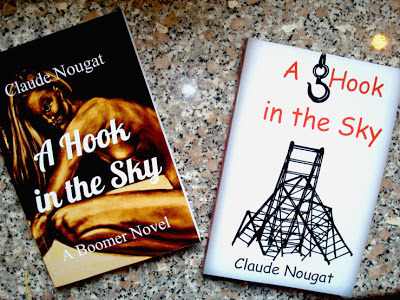
Hey, but that's the same book! Yes, on the left the new cover, on the right the old one. Yet they are both related to the story: the beautiful naked woman is the one Robert, our retiree-turned-artist, has painted with love; the pile of ladders reaching up to a hook is the (symbolic) contemporary art installation Robert has dreamed up and that will cause so much trouble.
Do let me know in the comments which cover you prefer! Though be warned, if you buy the book now, Amazon will send you the naked woman...
Now for the excerpt. What do you do when you ponder over a book? I'll tell you what I do. I read the opening paragraph (already presented to you, here) and turn the book over for a quick glance at the back cover:
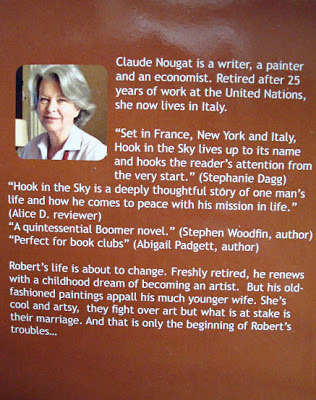
Then I flip through to the end of the book and read the last lines. Here:
She stopped in front of
his canvas.
“Ah, you’re back to painting! Robert, this is
beautiful. Is it Bangladesh? I love the emotion, the sadness in their eyes…”
He smiled. “Welcome to my world…”
She hesitated. His world? She looked at the two
girls wrapped in their bright colored sarees and smiled at them. Then, with
her expression unchanged, she turned to him. “I understand”, she murmured and
moved up to him.
He took her in his arms, he smelled her hair. He tightened his embrace, she let herself go,
still smiling. A tiny tear welled up in the corner of her eye, just one tear.
It felt good to be home.
The canvas referred to here is this one, two young girls standing in their water-logged fields after a flood (yes, I painted it):

Spoiler alert, I'm not going to tell you who Robert is talking to. Yes, there are three women in his life: his wife Kay, Natasha who's an old childhood friend (half Russian) and Nour, her daughter (half Iranian). Quite a collection!
Does the book end on a hopeful note? I think so and that indeed, is what I intended. Robert is on a quest to find himself once he's retired, and after a lot of trials and false starts, by the end of the book, he knows who he is, he knows what kind of world he wants to live in, he knows what his world is all about!
If you want to find out what sort of world it is, you'll have to read the book...
Available on Amazon, in e-book and paperback format: click here
Related articles
 Boomer Lit Featured on Major Publishing Industry Magazine(claudenougat.blogspot.com)
Boomer Lit Featured on Major Publishing Industry Magazine(claudenougat.blogspot.com)

Since today is Holy Friday for Christians, allow me to wish you a peaceful and happy Easter!

But what I propose to do now with you will be a little different from the last time. Imagine you enter into a book store and see these two books on the table:

Hey, but that's the same book! Yes, on the left the new cover, on the right the old one. Yet they are both related to the story: the beautiful naked woman is the one Robert, our retiree-turned-artist, has painted with love; the pile of ladders reaching up to a hook is the (symbolic) contemporary art installation Robert has dreamed up and that will cause so much trouble.
Do let me know in the comments which cover you prefer! Though be warned, if you buy the book now, Amazon will send you the naked woman...
Now for the excerpt. What do you do when you ponder over a book? I'll tell you what I do. I read the opening paragraph (already presented to you, here) and turn the book over for a quick glance at the back cover:

Then I flip through to the end of the book and read the last lines. Here:
She stopped in front of
his canvas.
“Ah, you’re back to painting! Robert, this is
beautiful. Is it Bangladesh? I love the emotion, the sadness in their eyes…”
He smiled. “Welcome to my world…”
She hesitated. His world? She looked at the two
girls wrapped in their bright colored sarees and smiled at them. Then, with
her expression unchanged, she turned to him. “I understand”, she murmured and
moved up to him.
He took her in his arms, he smelled her hair. He tightened his embrace, she let herself go,
still smiling. A tiny tear welled up in the corner of her eye, just one tear.
It felt good to be home.
The canvas referred to here is this one, two young girls standing in their water-logged fields after a flood (yes, I painted it):

Spoiler alert, I'm not going to tell you who Robert is talking to. Yes, there are three women in his life: his wife Kay, Natasha who's an old childhood friend (half Russian) and Nour, her daughter (half Iranian). Quite a collection!
Does the book end on a hopeful note? I think so and that indeed, is what I intended. Robert is on a quest to find himself once he's retired, and after a lot of trials and false starts, by the end of the book, he knows who he is, he knows what kind of world he wants to live in, he knows what his world is all about!
If you want to find out what sort of world it is, you'll have to read the book...
Available on Amazon, in e-book and paperback format: click here
Related articles
 Boomer Lit Featured on Major Publishing Industry Magazine(claudenougat.blogspot.com)
Boomer Lit Featured on Major Publishing Industry Magazine(claudenougat.blogspot.com)
Since today is Holy Friday for Christians, allow me to wish you a peaceful and happy Easter!

Published on March 29, 2013 03:32
March 27, 2013
Boomer Lit and Big Publishers: a Future Together?

Back in 2008, before the onslaught of the digital revolution, several of the (then) 6 Big Publishers, were already paying attention to Boomer Lit, in particular Simon & Shuster, HarperCollins and Hachette. The fact was reported by a major publishing industry magazine, the Writer's Digest, in an article with a highly provocative title: "On the Edge, Boomer Lit" (See here)
The case for Boomer Lit couldn't have been put more succinctly or with more force:
"It’s difficult to imagine that those 1960s doe-eyed children who
brought the world’s attention to Vietnam War protests and love-ins are
old enough to qualify as senior citizens. But they’ve finally
matured—and so has the fiction being written by and for them.
Seventy-eight million baby boomers are alive today and comprise an
enormous chunk of the reading public. As a result, there’s both a
growing demand for fiction that deals with age-appropriate issues and a
tendency for boomer-age writers to tackle parallel subjects in their
fiction. More and more baby-boomer protagonists, both in the genre and
literary arenas, are dealing with serious life issues such as unexpected
illness, failed marriages and lost dreams."
The article reported on two new imprints intended for boomers:
HarperCollins’ HarperLuxe, which featured large-print books, and
Hachette Book Group’s Springboard Press, a line of nonfiction aimed
specifically at boomers.
But no fiction.
However a few specific boomer novels under promotion at the time were mentioned, including Lesley Dormen’s first novel-in-stories, The Best Place to Be published by Simon & Shuster in 2007, which she wrote after she turned 50 and features a 50-something character. Hailed by Publisher's Weekly as an "accomplished collection", Dormen's book still sells on Amazon as a cheap paperback but with few copies left and it is yet to be turned into an e-book. The editor behind that book, Marysue Rucci, has become famous: shortly thereafter she joined G.P.Putman's Sons and has only recently returned to Simon & Shuster as Vice President and Editor-in-Chief. That may explain why Ms. Rucci's insight that having a middle-aged protagonist "wasn't a deterrent" got lost in the shuffles.
A similar story of push-and-withdraw accompanied the other books listed in the article, as they all sink in the virtual dust (more or less) on Amazon's shelves. I won't go through each one, but you can take Live a Little by Kim Green as perfectly illustrative of how a good intuition gets lost. Live a Little features a classic boomer life crisis and was published by Hachette's 5 Spot Publishing (focused on women's fiction and non-fiction). Here too, the acquiring editor, Amy Einhorn was highly supportive saying to The Writer's Digest: " I'd very much like to publish books with older protagonists, both male and female. For the same reasons that older people are often more interesting than younger people - they've lived more, they have more knowledge - these things show up on the page".
What happened to this enlightened editor after 2008? I'll tell you: she joined Putnam setting up her own imprint and raking up best sellers, she earned the admiration of the publishing community (see here). Her first fiction acquisition,
published in early 2009, was a debut novel by an unknown writer about
maids and housewives in Jackson, Miss. Well, you know the rest of the story: The Help , by Kathryn
Stockett, is still at the top of the bestseller lists and a movie was made that became a box office hit. Across all
formats it has sold more than 10 million copies in the United States. Since then,every February, Ms. Einhorn has launched a bestselling
novel: In 2010 it was Sarah Blake’s The Postmistress, In 2011 it was Eleanor Brown’s The Weird Sisters, in 2012 Alex George’s The Good American and the Gods of Gotham by Lindsay Faye.
All excellent books but not Boomer lit!
Why not? As I blogged last week, Boomer lit sells, the proof is the extraordinary success of both The Best Exotic Marigold Hotel by Deborah Moggach, from which a delightful movie was made and The Unlikely Pilgrimage of Harold Fry by Rachel Joyce, a debut novel by an unknown writer just as much as The Help was. The Unlikely Pilgrimage has now gained another 40 reviews in the five days since I last posted about it and gained further in ranking (it is now at #2,351 as I write), suggesting that it is selling steadily and in increasing numbers (see here), even ahead of The Best Exotic Marigold Hotel.
What is the problem then? One word explains it: the stigma that is still attached to old age and aging. When will the publishing industry shake it off? Back in 2008, age-related issues were at the heart of Nancy Thayer’s series, The Hot Flash Club . The series stars five women between the ages of 50 and 62.
They meet at a party and share their life problems that come with
getting older. The series marked a major genre change for Thayer, who had published
14 novels on family-related themes, but none aimed at older
women. “The philosophy in New York is that people won’t buy books about
older women,” she told the Writer's Digest. "But", she
pointed out, "23 million women are over the age of 50".
And that's a BIG reading market, these are women with time on their hands to read!
Indeed Nancy Thayer's series still sells on Amazon after all these years. Now an e-book, it is described as a "wise, wonderful and delightfully witty 'coming of age' novel about four intrepid women who discover themselves as they were truly meant to be: passionate, alive and ready to face the best years of their lives."
Boomer Lit is indeed meant to help people discover what their true self is after all those years spent working, and help them live their lives to the hilt. These are matters of concern to some 78 million Americans, not to mention boomers elsewhere. These are people with both the means and the time to buy and read books. How large does a market need to be before publishers wake up to the opportunity of exploiting it?
Related articles
 My Take on Boomer Lit(joanneguidoccio.com)
My Take on Boomer Lit(joanneguidoccio.com) A Baby Boomer Turns a Crisis into a Miracle(boomercafe.com)
A Baby Boomer Turns a Crisis into a Miracle(boomercafe.com) Boomers turn to encore careers after retiring(theaffluentboomer.wordpress.com)
Boomers turn to encore careers after retiring(theaffluentboomer.wordpress.com)

Published on March 27, 2013 04:03



